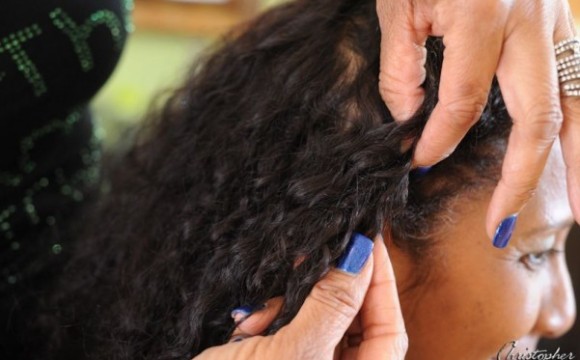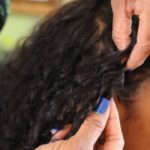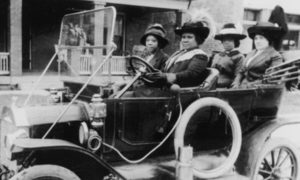Culture
The Roots of Good Hair: Two Sisters Plant Seeds for Natural Hair Styling and Care

Here’s a question: how much money do you spend annually on your hair? Black hair care is a nine billion dollar industry, and black women reportedly account for 80 percent of the country’s total hair product sales. The Saint Louis salon, The Nappy Kitchen, is rooted in the Midwest but hopes to grow nationally by offering excellent customer service.
St. Louis, Missouri – Holly Edgell
Nappy kitchen 1. The hairline on the back of the neck. 2. The hair on the back of the neck that is untamable. (Urban Dictionary)
You’ll find the Nappy Kitchen Salon & Store near the corner of Manchester and Tower Grove in St. Louis. It’s a neighborhood where shuttered homes and abandoned storefronts are making way for new businesses. Case in point: the salon sits next door to Sweetie Pie’s, the restaurant that spawned a reality show on Oprah’s OWN Network.
The restaurant moves to a new location this month; regrettable in the eyes of Nappy Kitchen owner Lana Coleman and her team, since they enjoyed the food and benefited from the exposure. Still, it’s not a deal-breaker by any means.
With a solid client base of about 100 regular customers, and the phones ringing off the hook for appointments on any given afternoon, The Nappy Kitchen seems poised to make it big.
New growth
Before the salon came the products, literally cooked up in the Atlanta kitchen of Coleman’s sister and salon co-owner Pamela Holmes. On a visit to St. Louis in 2008, Holmes presented Coleman with Seven Days of Shea and the Nappy Hair Shop Shampoo.
“She said, ‘I want you to try these products on your clients,’” Coleman recalled.
An advertising and marketing professional, Holmes experimented with ingredients and formulas and reached a eureka moment. “She said, ‘I think I have a good thing here.’”
Working out of a salon in Maplewood, Coleman asked a few of her clients to let her use the Nappy Kitchen products on their hair. Over the course of one year Coleman logged the results and their feedback.
“It got to a point that if I didn’t have the Nappy Hair Shop products they wouldn’t come in to get their hair done,” Coleman said.
Coleman and Holmes started selling the Nappy Hair Shop products online in 2009. At a natural hair show in Atlanta the following year, they heard one question over and over again:
“Where’s your salon?”
Planting seeds
Coleman grew up in the Webster Groves and Kirkwood communities and graduated from Ritenour High School. Still, she and her sister had their eye on Atlanta as the place to open their salon. As the trend-setting hub for African-American culture and society, it was a natural choice. But, finding an affordable location proved challenging.
As it happened, Coleman’s own landlord in St. Louis offered a solution: the dress shop next to Sweetie Pie’s had moved across the street. The space at 1110 Tower Grove Avenue was available.
“I always wanted my own salon,” said Coleman. “But I just didn’t know how to go about it.”
The Nappy Kitchen Salon & Store opened in November 2010.
“My clients were so excited for me,” Coleman said. “Because they knew this was always a dream and they knew about the products.”
Still, Coleman had to say goodbye to a few clients. She was determined to only provide natural services and products.
“We knew right off that we weren’t going to do any type of relaxing chemicals,” she said. Most of her clients were natural hair women, but at least five preferred relaxers.
A fresh take
The Nappy Kitchen Salon & Store looks and feels good: crisp celery-green paint decks the walls, which feature an eclectic selection of mirrors and artwork. Gleaming wooden floors and a cozy waiting area invite customers into a space that manages to sooth and inspire.
You get the feeling that whatever your hair “issue” is, everything is going to come out just fine.
“When we opened the salon, I wanted to make it so whoever walked in the door would feel comfortable,” said Coleman.
The Nappy Kitchen Salon experience begins with a free consultation. A stylist talks with the prospective client about hair type, styling options, and what kinds of treatments he or she has had before (for example color or chemical relaxer).
Photo albums featuring pictures of actual clients are introduced. A cup of tea, coffee or water will be offered.
“We do visual first,” explained stylist Shaniece Smith. ”We show them the book (photo album). Different styles. What fits their face. What looks good on them. We give them knowledge.”
Added Coleman, “I always thought like a teacher. Clients like the idea that they are educated. They know what is in their hair. And they know how to take care of their hair at home.”
After a client makes an appointment, he or she can count on receiving a reminder phone call a few days beforehand. It’s all about making life easier for the client, explained Coleman.
“Most women like to get up, do whatever they have to do and go on about their lives. They don’t want to spend all this time on their hair.”
Coleman loves to see regular clients return with healthy hair, using the care techniques and products she recommended.
“It makes me feel good when they tell me what they did. That lets me know that what I was telling them, it was getting through.”
Hair psychology
Let’s face it: hair is frustrating. It’s arguably the most fraught grooming item an African-American woman will face in her lifetime.
“Here at the salon I see women break down, because they can’t be themselves,” said Coleman. “They can’t wear their hair the way they want to. And they look beautiful. But it’s because they’re not accepted in whatever work force or other environment they’re in.”
Coleman, who has been a stylist for than 13 years, gets emotional when she talks about the ways in which African-American women and girls twist themselves into knots over their hair.
“That’s when the Nappy Kitchen steps in, with the education and the products.”
Stylist Angel Davy-Taylor has seen many reactions in newly natural clients, from elation to worry.
“It varies,” she said. “They don’t feel like maybe their boss will be as excited for them as they are. And we just try to find them a style that is coherent with their universe.”
Coleman and her stylists know making the move to a natural look can seem daunting for the women who come to the Nappy Kitchen.
“Natural hair is a very challenging thing. It’s a very emotional thing,” said Coleman. “Women can’t think of what to do with their hair to make it look presentable. Their hair isn’t feeling and looking like they thought it would.”
Davy-Taylor believes the Nappy Kitchen education process and on-going support are key parts of a client’s natural evolution.
“If you work with what you already have you’ll find you have so much fun with it. You’ll begin to embrace it,” she said.
Natural hair today
A review of magazines and other popular media shows the evidence: More celebrities and professional women are proudly sporting locs, braids, twists, Afros and other natural styles. Solange Knowles does it. So does Viola Davis. So does Melissa Harris-Perry, host of her own show on MSNBC.
- READ Essence magazine’s “Hot Hair: 20 Stars Sporting Natural Hair.”
- WATCH Solange Knowles telling Oprah why she decided to go natural
But, Coleman says many people have negative responses to seeing African-Americans with natural hairstyles.
“I hear women say they get reactions that are threatening, even within our own black community,” said Coleman. “When black men and women are working in the same company, men will say ‘Why do you wear your hair like that? What don’t you do something with it?’”
Men can feel the pressure, too. Nappy Kitchen client Mark Rogers wanted locs for years. It wasn’t until a career change found him selling motorcycles that he decided to go for it.
“For the most part everybody loves the locs,” he said. Would Rogers recommend locs to other men? “Do it because it’s what you want,” he said. “Not because it’s the trend.”
The Nappy Kitchen takes special care when it comes to children. Little girls may get messages about what makes “good hair” at a very young age.
“There’s so much peer pressure in schools. Children getting into things because they are not comfortable with themselves,” said Coleman. “I think it’s really sad in the adult world, we teach our children to be who they are, and then they go out here and they’re criticized. They hair has to decide who they should be.”
Young clients include bi-racial girls and their white mothers who want to learn about how to style and care for hair which is often thick, curly or kinky and—literally—a handful. White adoptive mothers come to the Nappy Kitchen seeking similar guidance, hoping to help instill pride for their children’s African-American roots.
Growing to the future
Coleman and Holmes have big plans. They’d like to fulfill their dream of opening a Nappy Kitchen Salon & Store in Atlanta and then branch out to other cities.
In the meantime, they continue to sell the Nappy Hair Shop products in the St. Louis store and online, retail and wholesale.
In a 21st Century twist, Coleman and her team use Facebook and Twitter to connect with clients and potential customers. They also hold regular “meet ups” at the salon, where participants can learn about the latest in natural styles, hair care, and sample Nappy Hair Shop products for free.
“When clients walk in here, we want to give to them. We want them to feel special.”
5 things about natural hair: Words of wisdom from the Nappy Kitchen Salon team:
- You need to know your hair type & subtype. We recommend the book Andre Talks Hair, by Andre Walker. http://www.oprah.com/style/African-American-Hair-Advice-from-Oprahs-Stylist
- Use all-natural products without sulfate and silicone.
- Research natural hair salons that specialize in natural hair care and products.
- Educate yourself about ingredients used in hair care products. Pay attention to labels and be aware of what products contain.
- Be happy with the hair you were born with: Good hair is the kind that stays on your head!
For more about natural hair:
- Black women natural hair styles, an blog and photo glossary of natural styles http://www.blackwomennaturalhairstyles.com/
- Nappturality, a portal to information about natural styles http://www.nappturality.com/
- Black hair history. ThirstyRoots.com provides a great timeline that tracks the evolution of attitudes about black hair, as well as styles and products http://thirstyroots.com/black-hair-history/discovering-our-roots-do-i-hatemy-hair
- Essence online provides a photo gallery of natural looks in its “Street Style” segment http://www.essence.com/2011/03/18/hot-hair-street-stylenatural-hairstyles/
- The World Natural Hair Health and Beauty Show, April 28-29 (Atlanta) http://www.naturalhairshow.org/
- Good Hair: The movie from Chris Rock – Check out the Good Hair YouTube Channel http://www.youtube.com/user/GoodHairMovie
Find the Nappy Kitchen Salon and Nappy Kitchen Hair Shop Products:
- Address: 1110 Tower Grove Avenue , St. Louis
- Telephone: (314) 535-1811
- Website: http://www.thenappykitchen.com/
- Email: info@thenappykitchen.com
- Facebook: https://www.facebook.com/thenappykitchen
- Twitter: @TheNappyKitchen
Find a natural hair salon near you:
- The Natural Hair Care Directory:
- http://www.thenaturalhaircaredirectory.com/TheNaturalHairCareDirectory.html
- Treasured Locks Directory: http://salons.treasuredlocks.com/natural-blackhair-care-salons.php

-

 Featured10 months ago
Featured10 months agoCalifornia Is the First State to Create A Public Alert for Missing Black Youth
-

 Featured9 months ago
Featured9 months agoAfrican American Leaders Stay the Course Amid Calls for President Biden To Bow Out of Race
-

 Featured10 months ago
Featured10 months agoThe Debate Fallout Lands on Both Candidates
-

 Featured9 months ago
Featured9 months agoPresident Joe Biden Decides to Withdraw from the Presidential Race
-

 Featured9 months ago
Featured9 months agoIn One of His Final Speeches as President, Biden Says It’s Time for ‘Fresh Voices’
-

 Featured9 months ago
Featured9 months agoPresident Joe Biden Describes Shooting of Donald Trump As ‘Sick’










